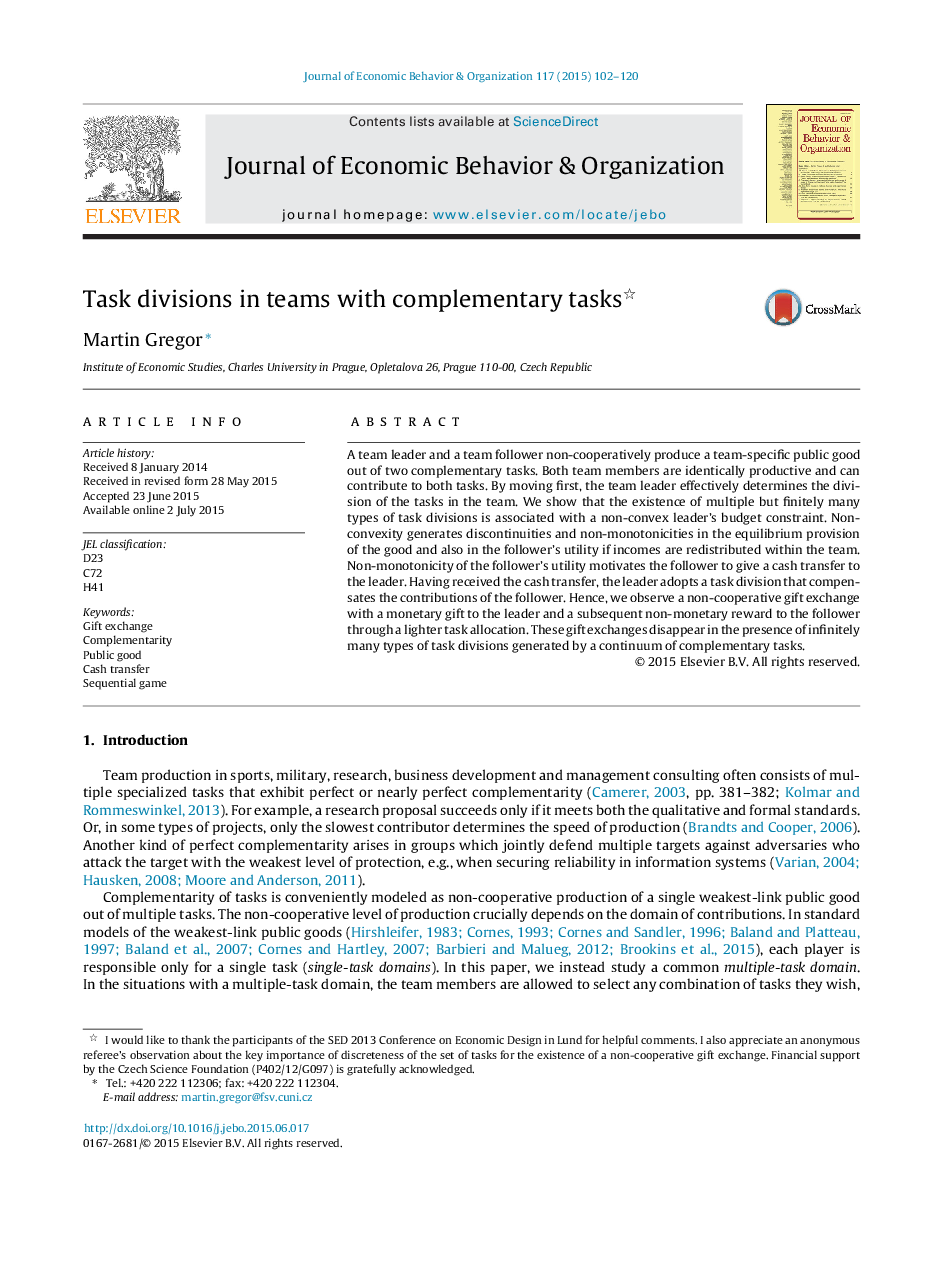| کد مقاله | کد نشریه | سال انتشار | مقاله انگلیسی | نسخه تمام متن |
|---|---|---|---|---|
| 7243044 | 1471647 | 2015 | 19 صفحه PDF | دانلود رایگان |
عنوان انگلیسی مقاله ISI
Task divisions in teams with complementary tasks
ترجمه فارسی عنوان
تقسیم وظیفه در تیم هایی با وظایف تکمیلی
دانلود مقاله + سفارش ترجمه
دانلود مقاله ISI انگلیسی
رایگان برای ایرانیان
کلمات کلیدی
ترجمه چکیده
یک رهبر تیم و پیرو تیم، بدون همکاری، یک تیم خوب عمومی را از دو کار تکمیلی تولید می کنند. هر دو عضو تیم به طور یکسان مولد هستند و می توانند به هر دو وظیفه کمک کنند. با حرکت اول، رهبر تیم به طور موثر تقسیم وظایف تیم را تعیین می کند. ما نشان می دهیم که وجود انواع چندین و چندین نوع تقسیم کارها با محدودیت بودجه رهبر غیرقابل کشش همراه است. عدم غوطه وری باعث ایجاد اختلالات و غیر مونوتونیک در ارائه تعادل از خیر و همچنین در ابزار پیروی می شود اگر درآمد در میان تیم توزیع شود. عدم تکوین بودن ویژگی پیرونده، پیروان را به هدایت انتقال پول به رهبر تحریک می کند. پس از دریافت پول نقد، رهبر یک بخش کاری را اتخاذ می کند که مشارکت پیروان را جبران می کند. از این رو، ما یک تبادل هدیه بدون همکاری با هدیه پولی به رهبر و پاداش غیرمنتظره بعدی به پیرو را با تخصیص وظیفه سبک تر مشاهده می کنیم. این تبادل هدیه در حضور بسیاری از انواع تقسیمات وظیفه ایجاد شده توسط یک پیوستار از تکالیف تکاملی ناپدید می شود.
موضوعات مرتبط
علوم انسانی و اجتماعی
اقتصاد، اقتصادسنجی و امور مالی
اقتصاد و اقتصادسنجی
چکیده انگلیسی
A team leader and a team follower non-cooperatively produce a team-specific public good out of two complementary tasks. Both team members are identically productive and can contribute to both tasks. By moving first, the team leader effectively determines the division of the tasks in the team. We show that the existence of multiple but finitely many types of task divisions is associated with a non-convex leader's budget constraint. Non-convexity generates discontinuities and non-monotonicities in the equilibrium provision of the good and also in the follower's utility if incomes are redistributed within the team. Non-monotonicity of the follower's utility motivates the follower to give a cash transfer to the leader. Having received the cash transfer, the leader adopts a task division that compensates the contributions of the follower. Hence, we observe a non-cooperative gift exchange with a monetary gift to the leader and a subsequent non-monetary reward to the follower through a lighter task allocation. These gift exchanges disappear in the presence of infinitely many types of task divisions generated by a continuum of complementary tasks.
ناشر
Database: Elsevier - ScienceDirect (ساینس دایرکت)
Journal: Journal of Economic Behavior & Organization - Volume 117, September 2015, Pages 102-120
Journal: Journal of Economic Behavior & Organization - Volume 117, September 2015, Pages 102-120
نویسندگان
Martin Gregor,
